
OR SPECTRUM
Scope & Guideline
Innovating Strategies in Business and Management Research
Introduction
Aims and Scopes
- Music Analysis and Theory:
The journal provides in-depth analysis and theoretical explorations of various musical forms and styles, including classical, contemporary, and popular music. - Interdisciplinary Approaches:
It emphasizes the intersection of music with other disciplines such as philosophy, sociology, and cultural studies, encouraging diverse perspectives in music scholarship. - Cultural and Historical Contexts:
Papers often explore the historical and cultural contexts of music, analyzing how these factors influence composition, performance, and reception. - Innovative Methodologies:
The journal promotes the use of innovative methodologies, including phenomenological, hermeneutic, and analytical techniques, to deepen the understanding of musical works. - Focus on Underrepresented Voices:
There is a consistent commitment to highlighting the contributions of underrepresented composers and musicians, fostering inclusivity within music theory.
Trending and Emerging
- Cultural and Social Analysis of Music:
Recent publications increasingly explore the cultural and social contexts of music, emphasizing how music interacts with societal issues, identity, and community. - Phenomenology and Music Perception:
There is a growing interest in phenomenological approaches to music, focusing on the perception and bodily experience of music, which opens new avenues for understanding musical engagement. - Innovative Composition Techniques:
Emerging themes include the analysis of innovative composition techniques, particularly in contemporary music, reflecting a shift towards exploring new musical languages and forms. - Intercultural and Global Perspectives:
The journal is seeing a rise in studies that address intercultural interactions and the global exchange of musical ideas, reflecting a more inclusive approach to music scholarship. - Music and Technology:
There is an increasing focus on the relationship between music and technology, examining how digital tools and platforms influence composition, performance, and analysis.
Declining or Waning
- Traditional Classical Analysis:
There seems to be a decline in papers focused purely on traditional classical music analysis, as the journal shifts towards more contemporary and interdisciplinary themes. - Historical Music Theory:
Research centered solely on historical music theory concepts is becoming less frequent, possibly as scholars prioritize contemporary applications and discussions. - Western-Centric Perspectives:
Papers that exclusively focus on Western music traditions are declining, indicating a growing interest in global music practices and intercultural studies. - Technical Aspects of Composition:
There is a noticeable decrease in the focus on purely technical aspects of composition, such as strict adherence to classical forms, with more emphasis being placed on creative and innovative approaches. - Narrowly Defined Genres:
Explorations of narrowly defined musical genres appear to be waning, as the journal embraces broader and more inclusive themes that transcend specific categories.
Similar Journals

Zeitschrift der Gesellschaft fur Musiktheorie
Empowering a global community of music scholars.Zeitschrift der Gesellschaft für Musiktheorie (ISSN: 1862-6750, E-ISSN: 1862-6742) is a premier open-access journal published by the Gesellschaft Musiktheorie, devoted to advancing the field of music theory. Since its inception in 2003, it has provided a crucial platform for the dissemination of innovative research, theoretical discourse, and critical discussions pertinent to music analysis, pedagogy, and aesthetics. Based in Berlin, Germany, this journal not only showcases the latest in musicological scholarship but also fosters a vibrant community of researchers, practitioners, and educators. With a commitment to accessibility, all published articles are freely available, enhancing the reach and impact of the work within the global music community. This journal is essential reading for anyone seeking to deepen their understanding of musical structures and practices, making it an invaluable resource for students, academics, and music professionals alike.
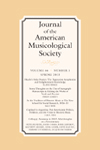
JOURNAL OF THE AMERICAN MUSICOLOGICAL SOCIETY
Illuminating the rich tapestry of music history.JOURNAL OF THE AMERICAN MUSICOLOGICAL SOCIETY, published by University of California Press, is a prestigious peer-reviewed journal dedicated to advancing the field of musicology. With an ISSN of 0003-0139 and E-ISSN 1547-3848, this journal has been a cornerstone of scholarly communication since its inception in 1970 and continues to be relevant through 2024. Its esteemed standing is reflected in its Q2 ranking in the Music category and a respectable 71/180 ranking in the Arts and Humanities discipline, placing it in the 60th percentile among its peers. The journal provides an essential platform for researchers, professionals, and students to explore diverse topics in musicology, ranging from historical studies to contemporary analyses. While it does not currently offer Open Access options, its rigorous editorial standards ensure the publication of high-quality research that contributes significantly to the academic dialogue in music studies. With its address based in the United States at 155 Grand Ave, Suite 400, Oakland, CA 94612-3758, the journal remains a vital resource for those seeking to deepen their understanding of the complexities of music and its societal impacts.

Oido Pensante
Exploring the Soundscape of Cultural StudiesOido Pensante is a prominent open-access journal dedicated to the multifaceted field of music, published by the esteemed University of Buenos Aires, specifically through its Faculty of Philosophy and Letters, Institute of Anthropological Sciences. Since its inception in 2013, this journal has fostered a rich platform for scholarly discourse and innovative research at the intersection of music and cultural studies. With an ISSN of 2250-7116, Oido Pensante aims to bridge theoretical frameworks and practical applications, making significant contributions to the understanding of music in its social context. Currently, it holds an impressive Q3 ranking in the Arts and Humanities – Music category for 2023, with a Scopus rank of #99 out of 180 journals, reflecting its commitment to academic rigor and relevance. The journal's open access policy ensures that research is widely disseminated and accessible, making it an invaluable resource for researchers, professionals, and students alike in Argentina and beyond. With converged years from 2017 to 2024, Oido Pensante continues to expand its reach, encouraging intellectual exchange and stimulating dialogue within the music community.

Musicologica Brunensia
Unveiling Musical Insights for AllMusicologica Brunensia, an esteemed journal published by Masaryk University, Faculty of Arts, serves as a significant platform for the dissemination of knowledge in the field of musicology. Based in the Czech Republic, this Open Access journal has been facilitating scholarly communication since 2009, allowing unrestricted access to its rich array of research articles. With an ISSN of 1212-0391 and an E-ISSN of 2336-436X, Musicologica Brunensia proudly holds a Q3 ranking in the Music category as of 2023, reflecting its dedication to advancing research in the arts and humanities, particularly music. The journal accepts contributions spanning diverse topics within music studies, fostering interdisciplinary dialogue among researchers, professionals, and students alike. Located at Arne Novaka 1, Brno, 60200, Czech Republic, Musicologica Brunensia is poised to continue its journey of promoting innovative scholarship in musicology until 2024 and beyond, making it a valuable resource for anyone passionate about the field.
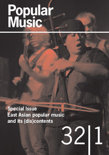
Popular Music
Transforming Perspectives on Contemporary MusicPopular Music, published by Cambridge University Press, is a leading academic journal that has been at the forefront of contemporary music studies since its inception in 1981. With its comprehensive scope encompassing a rich diversity of topics within the fields of Cultural Studies and Music, this journal holds a respectable Q2 ranking in both categories as of 2023, underscoring its significant impact on the scholarly discourse surrounding popular music. Researchers, professionals, and students alike will find invaluable insights within its pages as it explores the socio-cultural dynamics of music from various global perspectives. While it is not an open-access journal, the publication aims to foster critical dialogue and interdisciplinary scholarship. Based in the United Kingdom, Popular Music serves as a vital resource for those interested in the intersections of music, culture, and society, sustaining a vibrant academic community through rigorous peer-reviewed articles and reviews. Engage with the latest research and deepen your understanding of popular music's ever-evolving landscape.
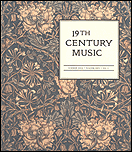
NINETEENTH CENTURY MUSIC
Exploring the Harmonies of HistoryNineteenth Century Music is a prestigious journal published by University of California Press that has been a vital contributor to the understanding of musical trends and cultural contexts from the 19th century. With an ISSN of 0148-2076, this journal operates within the Q2 category in Music, ranking 96 out of 180 in the Arts and Humanities, reflecting its significant influence and recognition in the field. Established in 1977, it aims to explore diverse topics ranging from music theory to historical analysis, providing a comprehensive platform for researchers, professionals, and students interested in this rich period of music history. While currently not an open-access journal, it offers an array of subscription options that enhance access to its scholarly content. The journal continues to play a pivotal role in documenting and critiquing the myriad ways in which music intersected with the social and artistic movements of the 19th century, making it essential reading for anyone seeking to delve deeper into the subject.

MUSICAL TIMES
Delving Deep into the Art and Science of MusicMUSICAL TIMES is a distinguished journal dedicated to the exploration and dissemination of scholarly works in the realm of music, serving as an essential resource for researchers, professionals, and students alike. Published by MUSICAL TIMES PUBLICATIONS LTD, this journal has built a robust reputation within the arts and humanities, specifically focusing on music studies, with an impactful reach indicated by its Scopus ranking at #73 out of 106 in the field. Though access to this journal is not open, its curated content, which spans various facets of musicology and contemporary music discourse, enriches the academic community by encouraging insightful discussions and critical analyses. With its historical roots tracing back to its inception, MUSICAL TIMES aims to foster a deeper understanding of music's cultural, social, and artistic dimensions, making it a valued publication for those engaged in the scholarly pursuit of music.

RIVISTA ITALIANA DI MUSICOLOGIA
Unveiling the Rich Tapestry of Musical KnowledgeRIVISTA ITALIANA DI MUSICOLOGIA, published by the Italian Society of Musicology, is a distinguished journal dedicated to the field of musicology, offering a platform for scholarly research and discourse on a wide array of musical topics. With an ISSN of 0035-6867 and an E-ISSN of 2036-5586, this journal has contributed significantly to the understanding of music in cultural and historical contexts. Although the scope of coverage was marked from 2003 to 2008 in renowned databases like Scopus, the journal continues to serve as an invaluable resource for researchers, educators, and students embroiled in music studies. Its emphasis on rigorous research and critical analysis makes it a vital asset for anyone seeking to deepen their knowledge of musicological inquiry. While not an open-access publication, the RIVISTA ITALIANA DI MUSICOLOGIA remains a prestigious outlet for scholarly contributions that reach audiences eager to explore the complexities of musical heritage.
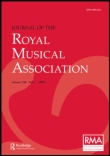
JOURNAL OF THE ROYAL MUSICAL ASSOCIATION
Unveiling new perspectives in musical practices.JOURNAL OF THE ROYAL MUSICAL ASSOCIATION, published by Cambridge University Press, stands as a significant repository for innovative research and scholarly discourse within the field of music studies. Recognized for its contributions to the understanding of musical practices, theory, and history, this esteemed journal offers a platform for academics and researchers to disseminate their findings to a broad audience. With an ISSN of 0269-0403 and E-ISSN of 1471-6933, the journal has maintained a notable presence since its inception, merging insights from both traditional and contemporary musicology. It currently occupies a Q4 ranking in Music within the Scopus database, reflecting its inclusion within the arts and humanities landscape. While the journal traditionally operates under subscription access, its continuing commitment to advancing music scholarship ensures that it remains an essential resource for students, scholars, and practitioners alike, fostering greater understanding and appreciation of musical artistry from 1987 to the current era.
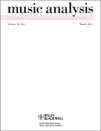
MUSIC ANALYSIS
Illuminating the Intersection of Music and CultureMUSIC ANALYSIS, published by WILEY, is a prestigious journal in the field of musicology, recognized for its critical contributions to the analysis of music and its myriad influences on culture and society. With an ISSN of 0262-5245 and an E-ISSN of 1468-2249, this journal has established itself as a vital resource for researchers, professionals, and students alike, boasting a Q1 ranking in the 2023 category of Music. As part of a highly competitive field, it ranks 70th out of 180 in the Arts and Humanities Music category on Scopus, positioning it within the 61st percentile. MUSIC ANALYSIS serves as an essential platform for innovative research and insightful discourse, engaging with musical theory, practice, and education from 1996 to 2024. Its commitment to fostering rigorous scholarship makes it indispensable for those seeking to deepen their understanding of music and its analytical frameworks. Although it does not offer Open Access options, its relevance and impact in the genre ensure accessibility through institutional subscriptions and university libraries.